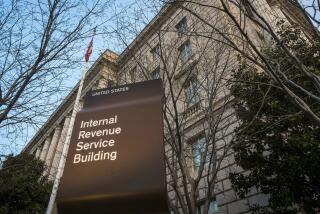Ways to Reduce Your Chances of Being Audited
- Share via
Many of us wonder, as we prepare our income tax returns, what the chances are of getting called in by the Internal Revenue Service to explain our figures and calculations. The good news: Less than 1% of all returns filed are selected for audit.
Who Gets Audited
Tax return data is analyzed by computer at the IRS National Computer Center. Each tax return is given a score--the higher the score, the more audit potential the return has.
IRS classifiers (human beings) look at the 10% with the highest scores. About 90% of these returns aren’t audited. The rest are sent to the local IRS district offices for more screening. This method selects 75% of the returns the IRS audits. The other 25% are chosen for one of these six reasons:
IRS special projects. Every year, the IRS commissioner scrutinizes certain businesses and occupations. Past favorites include doctors, waiters and airline pilots. Also targeted are people working for or running cash businesses, such as bars and Laundromats.
Prior audits. Previous IRS audits often beget new ones. If you were audited and the IRS made large adjustments, you may well hear from the IRS again.
Criminal activity. If you are charged with a crime involving large cash transactions, such as drug trafficking, expect an IRS audit, if not a criminal tax investigation.
Amended returns and refund claims. Most people amend returns to claim an overlooked tax deduction resulting in a tax refund. About one in three of these amended returns are audited.
Informants’ tips. Ex-spouses, disgruntled business associates or former employees and law enforcement agencies can all report you to the IRS. Fewer than 5% of all audits result from tattletales.
Random selection. The IRS audits about 50,000 individual taxpayers at random every three years. Considering that over 100 million individual income tax returns are filed each year, your chances of being selected are quite small. This program has been suspended for further review by the IRS, but it is likely to return.
How to Reduce Chance
of Being Audited
There’s no sure-fire way to make your tax return audit-proof, but you may be able to reduce your audit risk. Here are some suggestions:
1--Include evidence for large deductions. If you claim large deductions for unusual items, such as an earthquake, flood or fire loss, attach documentary proof (copies of repair receipts, canceled checks, insurance reports and pictures) to the back of your tax return. This won’t stop the IRS computer from flagging your return. These attachments, however, may convince the IRS classifier not to audit you.
2--Prepare your tax return by computer. A neat, computer-prepared return looks more “official” and fits the IRS bias favoring computer processing. Most tax preparers now use computers. There are some good reasonably priced personal computer programs that you can use, such as Turbo Tax or TaxCut and MacInTax.
3--Don’t use electronic filing or the IRS pre-printed address label on your tax return. Either of these enables the IRS to get your return into the processing cycle, including the audit cycle, more quickly. On the flip side, however, using electronic filing or the label usually means that any refund due you will come faster. If you expect a refund but fear an audit, you’ll have to weigh the pros and cons.
4--File, but leave a few dollars unpaid. (Obviously, this doesn’t apply to people due a refund.) The IRS denies it, but the theory is that by owing a small amount, $100 or so, your file will be sent to the Collection Division before being considered for audit.
This reasoning assumes that your file can’t be in two places at the same time, which is doubtful in this Electronic Age. Nevertheless, the worst that can come from leaving a small balance unpaid is the accrual of small amounts of interest and penalties. You can pay the tax once you start receiving collection letters.
5--Report side-job income as “other income.” Try this only if this income is small compared to the rest of your income and you are not claiming any business deductions against it. Technically, side-job income is supposed to be reported on Schedule C, “Profit or Loss from Business.” But filing a Schedule C increases your audit chances, so calling side-job income “other income” (line 22 of your tax return), may help you avoid the attention of IRS computers.
6--Live in a low-audit area. Your audit chances vary radically depending on where you live. For example, Nevada taxpayers are audited four times more than people in Wisconsin. While moving just to avoid an audit is extreme, if you have flexibility in choosing your tax reporting address (if you travel most of the time or have several homes), choose the one with the lower audit rate. You can find the statistics in the IRS commissioner’s annual report.
Frederick W. Daily is a San Francisco tax attorney. This article is excerpted from Daily’s book “Stand Up to the IRS” (Nolo Press: $19.95) and is available at bookstores or by calling (800) 992-6656.
More to Read
Inside the business of entertainment
The Wide Shot brings you news, analysis and insights on everything from streaming wars to production — and what it all means for the future.
You may occasionally receive promotional content from the Los Angeles Times.










